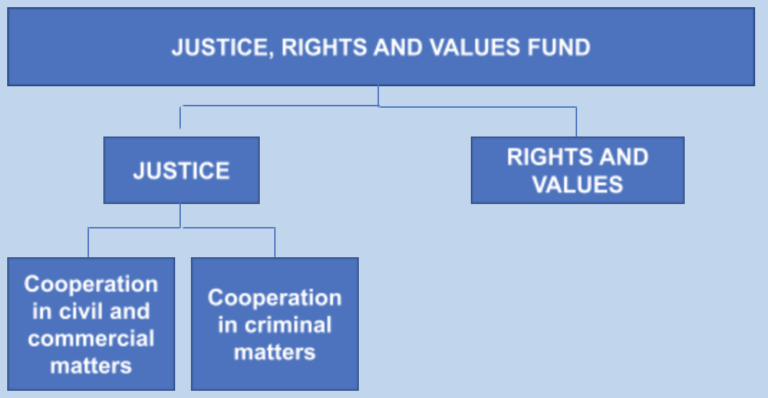
Justice Programme
General information
Previous name: Justice Programme
Organigram

Introduction
The program aims to contribute to the further development of a European area of justice based on mutual recognition and mutual trust. It promotes:
- judicial cooperation in civil matters, including civil and commercial matters, insolvencies, family matters and successions, etc.
- judicial cooperation in criminal matters
- judicial training, including language training on legal terminology, with a view to fostering a common legal and judicial culture
- effective access to justice in Europe, including rights of victims of crime and procedural rights in criminal proceedings
- initiatives in the field of drugs policy (judicial cooperation and crime prevention aspects)
- e-Justice
- supporting crime victims
Focus of funding for 2021-2027
Eligible actions:
- Training activities (staff exchanges, workshops, development of training modules,…)
- Data collection, analysis
- Mutual learning, cooperation activities, exchange of good practices, peer reviews, development of ICT tools…
- Awareness-raising activities, dissemination, conferences,…
- Support for main actors (key European NGOs and networks, Member States’ authorities implementing Union law,…)
- Analytical activities (studies, data collection, development of common methodologies, indicators, surveys, preparation of guides,…)
Thematic Priorities
- Research & Innovation
- Justice
Participating countries
- EU27 (NO DK)
- IPA
- ENP
- ASEAN
- EFTA & EEA
- Other third countries with specific agreement for participation
Possible applicants
- NGOs
- SMEs/Enterprises
- Research Institutes
- Public Bodies
- Training institutions
- Non-profit organizations
- International Organizations
Target group / Final beneficiaries
- Researchers / Academics
- Citizens and Judiciary and judicial staff
(judges, prosecutors, court staff, lawyers, notaries, bailiffs, enforcement officers, insolvency practitioners, mediators, court interpreters, court experts, prison staff, probation officers)
Budget
Total Budget for 2014-2020
EUR 377,6 million
Total Budget for 2021-2027
EUR 305 million
Increase / Decrease in %
Decrease of 19,23 %
Budget per project
Average
EUR 180.000-400.000
Min.
EUR 75.000
(depending on the call)
Max.
EUR 600.000
(depending on the call)
Complexity of budget from 1 (easy) to 5 (difficult): 4
Criteria for the complexity of budget (How detailed is the budget, how complex is the documentation, availibility of documentation, etc.)
- Guidelines for applicants (including financial rules) are clear
- The call identifies specific EC directives and regulations where the EU approach is needed to enhance the common EU Legal Area
- Detailed budget lines for each partner: travel, equipment, other costs, subcontracting, personnel (person-month for work package)
- Partners’ administrative information and annexes to be uploaded on the Participant Portal
- The application package includes: Technical Part Template (Part B), Annex with indicators (xls format), staff CVs (PDF file) and letters of support from associate partners
Tips for applicants on budgeting
- A file for the budget definition is provided to help allocate project’s costs and fill in the proposal. It has not to be uploaded
- Real costs must be applied
- Partners’ responsibilities (tasks and work package leaders) should be reflected in the budget composition and allocation of person-months
- Budget distribution: keep an overall balance among partners and countries, avoiding budget concentration
Programme-Specific Tips for Applicants
2-3 lessons learnt in 2014-2020
- The awarding rate of calls for proposal ranged between around 16% and 47% . With respect to the specific objectives “Judicial Cooperation” and “Judicial Training”, almost half of the applications submitted were awarded.
- The Justice Programme promotes projects with a European dimension to tackle cross-border issues funding activities in key areas that are not necessarily high on the agenda of Member States.
- Thanks to its structure, with broad specific objectives, the Programme is able to timely respond to evolving and emerging needs.
Programme Specific Practical Information
- Ensure practical feasibility of the project: include as partner/associate partner representatives of the target group;
- Letter of support from organizations representing the target group are positively evaluated (Ministry of Justice, managers of prisons, council of notaries, mediators, human rights observatories, NGOs);
- Time needed for proposal preparation: 2 months for experienced designers (depending on partners’ commitment and collaboration).
- The file with indicators has to be carefully filled in with realistic numbers for outputs and outcomes: it is the EC’s tool for the evaluation of project’s results.
Positive aspects
- The programme is addressed to very specific targets and objectives: the competition is lower
- Work Programme describes the calls’ topics, so the proposal preparation can start before their official publication
- The Part B template is not as complex as the H2020 one
- Flexibility during the project implementation: budget shifts up to 20% of the total budget are allowed
- Clear rules and templates for technical/financial reporting
Negative Aspects
- The budget: obstacle for applicants without specific skills
- The overall budget per project is quite low
- Indicators sometimes are hard to assess or to describe
DOs and DON'Ts
DOs
01.
Clearly define a specific problem to be addressed.
02.
Provide updated and detailed data (statistics, data) for the “context” section.
03.
Clearly identify your target group and ways to reach it.
04.
Show the project impact using realistic indicators.
05.
Deliver practical outputs useful for the Justice operators/stakeholders.
DON'Ts
01.
Limit the partnership to the minimum eligibility requirements.
02.
Include partners without clear roles.
03.
Foresee too many deliverables.
04.
Include too many project meetings.
05.
Include a general/vague dissemination strategy or describe the benefits for the target groups in a general way
